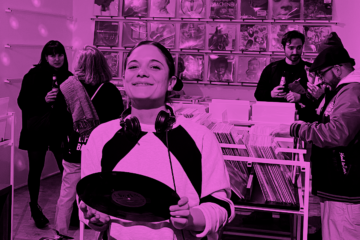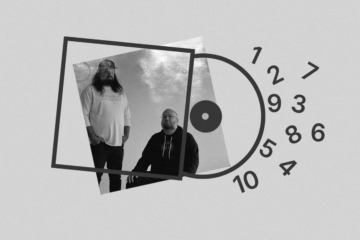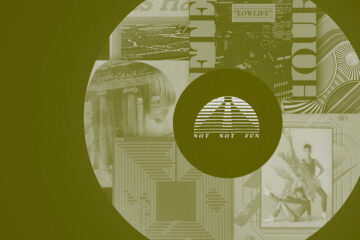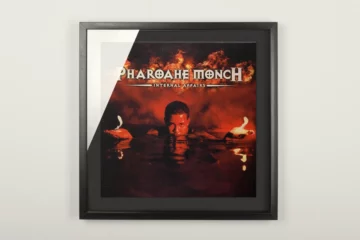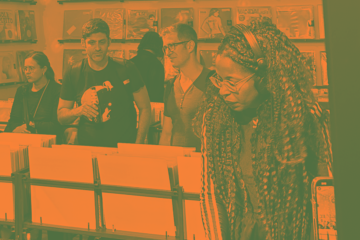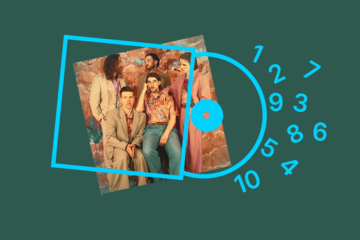Caution is mandatory when a label dwells on claims of otherness and original release policy. More often than not, those claims remain what they are without actual brave, new, unconventional releases substantiating them – true trailblazers rarely appoint themselves. When Kiran Sande founded Blackest Ever Black almost exactly ten years ago, his motives therefore were as modest as they were honest: »Guilt, envy, revenge. Those aren’t the sustaining forces of the label, of course, but they were certainly what brought it into being. There were other factors too: I mean, Blackest Ever Black is nothing if not the sound of one man’s struggle to give up smoking«, the ex-editor-in-chief at FACT Magazine remembers in an interview with Resident Advisor. Central for the formation and development of the label were, besides Sande himself, two London-based producers named Joe Andrews and Tom Halstead, whose mystically distorted dark ambient as Raime made a lasting impact on the BEB founder – and thus influenced the curation of the imprint.
Although rooted in the broad spectrum of electronic music, recent developments in house, techno and dance music in general didn’t play much of a role at first. Instead Sande got inspired by drone music and doom metal as well as ’93-’94 jungle and the seminal industrial of the late 70s and early 80s.
»[…] but it was Raime who prompted me to go further and harder into it, and then to connect it all with the contemporary landscape, to use it to interrogate the present moment, and the moment yet to come. At the risk of sounding trite, they reminded me that music—from the underground on up—is all about time travel, and that you can move both ways at the same time.« This push forward towards yesterday and tomorrow is defined by unconventional works, to which Blackest Ever Black consistently granted extraordinary significance considering the growing distance from the mainstream plus its deltas. Rich in cryptic adumbrations, acoustically as well as optically, in the first years the label already released such criminally underrated albums like Raimes debut »Quarter Turns Over a Living Line«, which seemingly recounts a nightshade delirium, Camella Lobos still only album as Tropic Of Cancer »Restless Idylls« or the febrile techno-wave-symbiosis »Through The Window« by Prurient.This push forward towards yesterday and tomorrow is defined by unconventional works, to which Blackest Ever Black consistently granted extraordinary significance considering the growing distance from the mainstream plus its deltas.
The 2010s with their cultural, political and ecological upheavals, but also with a flood of new genres and ongoing mutations of our listening habits, the ways in which we perceive and consume music – they seemed to call for an underground laboratory just like this. Though it was rather a certain boredom as editor at FACT, being bombarded with promo CDs and links on a daily basis without ever hearing significantly fresh ideas, that disillusioned Sande and prompted him to gather such ideas under a single umbrella. The art of omission was always crucial in the selection of music that were deemed suitable for Blackest Ever Black. »As much as I loathe the word ‘curation’ – the one soundbite I adhere to is that the most important part of running a label is exclusion rather than inclusion. It’s about saying no. Establishing limitations.« Considering that the label catalogue showed a rigorous originality right from the get go because of that policy, most listeners and even artists seemed not too deterred – quite the contrary.
You can find the Viny Records of Blackest Ever Black in the [webshop of HHV Records](https://www.hhv.de/shop/de/blackest-ever-black-vinyl-cd-tape/i:D2I1L26809N4S6U9)
Quickly the label became a hot spot for unexpected musical resurrections, like that of Black Rain, a project founded in 1988 in New York which didn’t release a studio album for almost twenty years before the stunning »Dark Pool« came out. But also Lustmord, Stefan Jaworzyn or Regis presented new material, while new and equally offbeat artists like Dalhous, Carla dal Forno or Pessimist emphasized the relevance of their artistic approach: experimentation, striving, venturing – during the 2010s that frankly didn’t seem anywhere more possible than at Blackest Ever Black, especially concerning edgy, uncomfortable sound designs. Midterm highlight: The »Five wretched years of Blackest Ever Black« label night at Berghain on the 30th of October 2015, during which Raime, Prurient, Tropic Of Cancer, Regis, Felix K and Diät made for some unforgiving and unforgettable shows between metropolitan paranoia, end times atmosphere and artistic exhaustion until the late morning hours – a level of intensity and immersion that lived up to the label as well as the venue.
Born in London, grown up in Berlin and then relocated to London again, BEB quite quickly shaped up as a catalyst of sensory subversion within an ever diversifying scene. Not just individual distinguished producers bore witness to that, but also top-class label compilations like »Scripts Of The Pageant« (with Caroline K, Andrew Liles, Death In June, Tropic Of Cancer, Prurient), »The Disappointment Engine« (with Jon Brooks, The Shadow Ring, The Threshold Houseboys Choir, Alberich, Ramleh) or »I Can’t Give You The Life You Want« (Tarquin Manek, Bremen, Cut Hands, Secret Boyfriend) pointed towards the open-mindedness for the transgressive, something the 1983-born label boss Sande had a soft spot for since his early youth.
Not least because he grew up reading the British music press during the 90s, which in publications like Melody Maker, Mojo, Select or The Face cultivated quite a non-compliant style. Back then, paralleled in Germany only by Intro, Visions or Groove. »Much of what I got out of these magazines, though, was more a matter of me making inferences and using my imagination: I still remember poring over a page in Select advertising 10+ Gong reissues, staring at the titles and cover images, trying to imagine what Gong might sound like (and getting it horribly wrong). Not to be too hammy about it, but you couldn’t just go online and check out what an artist sounded like, so of course the words meant so much more; sometimes everything. Are there any moments more exciting in life than those that exist between you learning of an interesting record and you actually hearing it?«»Are there any moments more exciting in life than those that exist between you learning of an interesting record and you actually hearing it?«
These were exactly the moments for which Blackest Ever Black was and is cherished by connoisseurs of disturbing and intoxicating sounds in all of Europe. But when the abstractly fascinating »Sekundenschlaf« was released at the beginning of 2018 by an allegedly West Russian unemployed producer named Fedor Servolenko aka тпсб (more likely a pseudonym for a Cologne-based lad called Gregor, registered at Soundcloud as Tut Ench Armut), nobody suspected how close the label already came to its end. If nothing else, just because in relatively short intervals the wrongly overlooked space rock combo Bremen released their »Enter Silence«, followed by the ingenious studio debut of Daniel Davies aka Ossia and the extremely impressive post-punk revival »Positive Disintegration« of Berlin-based Diät, all of which stood up to the label’s quality standards – Blackest Ever Black seemed ready for another wretched decade. And then everything came to an end. The reasons? Even after multiple requests Kiran Sande would not comment on them. Maybe it was just the stress of a life on permanent subsistence level that became unbearable in the long run. Final release: The deeply melancholic compilation »A Short Illness From Which He Never Recovered«, whose title at least leaves room for unfounded speculations about the reasons for the end of the label.
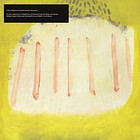
You can find the Viny Records of Blackest Ever Black in the [webshop of HHV Records](https://www.hhv.de/shop/de/blackest-ever-black-vinyl-cd-tape/i:D2I1L26809N4S6U9)


